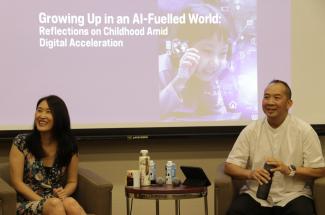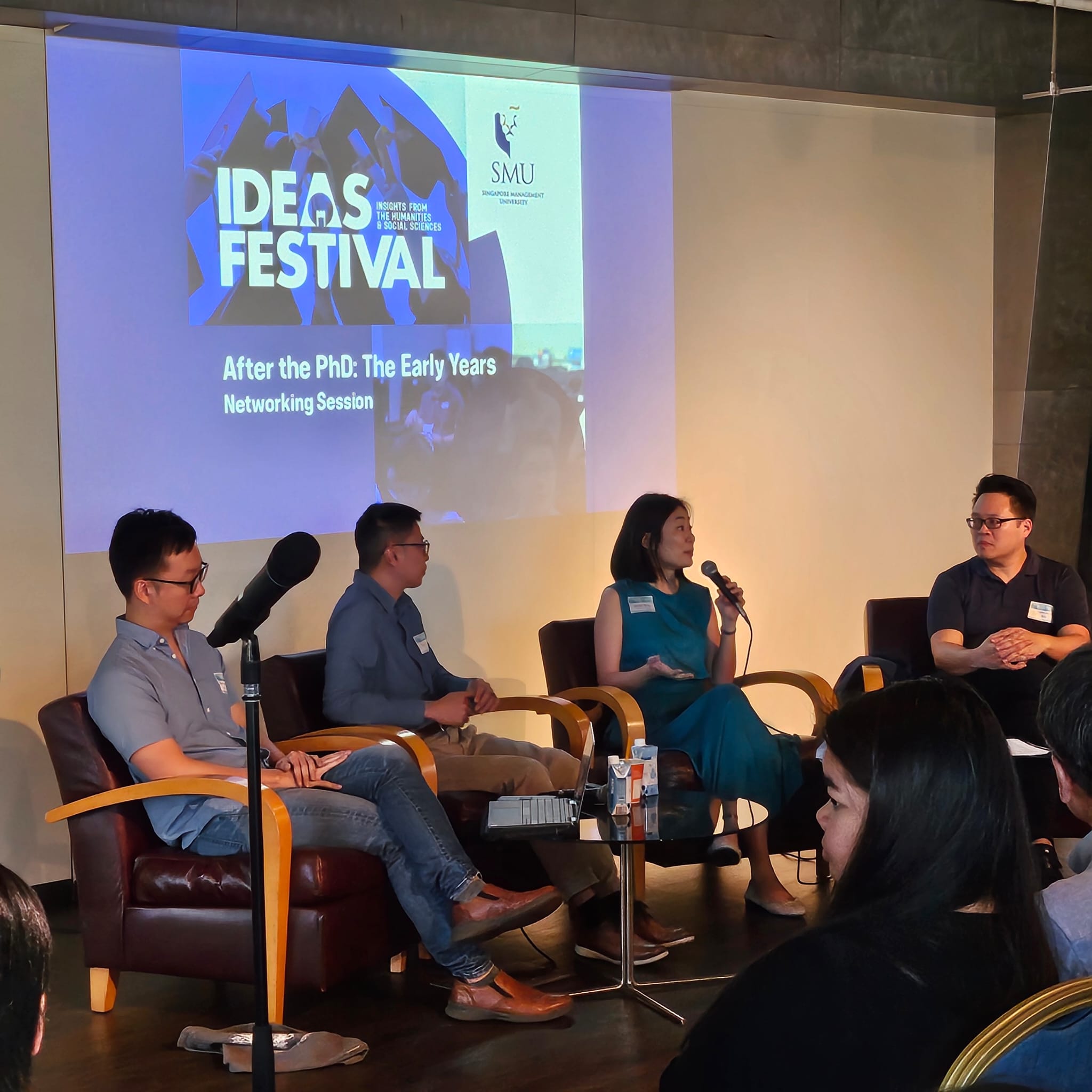
How are digital spaces affecting the way children grow and develop? What resources are on hand to support parents and children in reaping the gains and mitigating the risks of digital acceleration? Given that the formative years of childhood influence an individual’s manner of interacting with others in adulthood, these questions are well worth close scrutiny.
Singapore Management University (SMU) College of Integrative Studies (CIS) organised a public lecture, Growing Up in an Al-Fuelled World: Reflections on Childhood Amid Digital Acceleration, on 5 April 2024 to give firsthand insights about the pivotal role that parents play as the key architects of their child's media environments.
Helmed by SMU Vice President (Partnerships and Engagement) and Professor of Communication and Technology, Lim Sun Sun, the nuanced discussion parsed the social impact of technology, including digitalisation’s promises and pitfalls within a disruptive Al-fuelled world. Held on SMU campus, the evening lecture was attended by more than 50 guests, comprising members of the public, government officials, as well as SMU faculty and staff.
“It’s not always easy growing up in an AI-fuelled world,” shared Prof Lim. “So when I was asked to give a talk that would interest the public and demonstrate the value of social science research, I chose a topic that would help parents make better sense of digital acceleration for themselves and their kids.”
The public lecture marked the second week of activities organised under the Singapore Ministry of Education’s inaugural Social Science and Humanities Ideas Festival. Launched on 20 March 2024 by Education Minister Chan Chun Sing, the Ideas Festival featured a series of talks, workshops and seminars which aimed to demonstrate how social sciences and humanities research could be a driving force to address emerging societal, technological and regional challenges in Singapore and the region.
Drawing on social sciences and humanities research on the social implications of AI, as well as examples from her book, Transcendent Parenting: Raising Children in the Digital Age, Prof Lim illustrated the positive ways in which technology might be harnessed. From serving as an important link connecting individuals during the lockdown of the Covid-19 pandemic, to being a powerful conduit for education and entertainment, technology held the promise of bridging communities and bringing people together.
With the advent of generative AI, Prof Lim highlighted the opportunities for children today to interact frequently with chatbots. Of note, she reminded parents that much of the responses delivered by chatbots are statistically generated, and to help their children understand that these are ultimately robots. If children were to develop a certain dependency or show a proclivity towards interacting far too frequently with such chatbots, parents might want to intervene and gently explain that these are programmed personas in the cyber realm and not actual people.
Prof Lim encouraged parents to build trust with children, and to be prepared that tensions might crop up from time to time. Her presentation was followed by a lively Q&A session moderated by Associate Prof Jiow Hee Jhee, Media Literacy Council Member & Programme Leader at the Singapore Institute of Technology.
A strong network for the post-PhD journey
In addition to the public lecture, SMU organised a Postgraduate Networking Session in support of the Ideas Festival.
Taking place on campus on the evening of 4 April 2024, the session served as an opportunity for senior and graduating PhD students in the humanities and social sciences to network with peers and to gain valuable insights. More than 30 guests attended the in-person event, where researchers from local universities related their experiences with early career research as well as alternative academic options.
“The Ideas Festival is meant to showcase the importance of social sciences and humanities research in enriching our understanding of complex and dynamic social issues, issues shaped by historical and ongoing technological advances,” said Ngoei Wen-Qing, Associate Professor of History and Associate Dean (External Engagement), SMU CIS.
“The work you do is a key strategic asset for any nation in a time of volatility, uncertainty, complexity, and ambiguity, an era of disruptive rather than imperceptible and subliminal change. It's when things become so very unpredictable, changeable and adverse, that researchers—the thought leaders—must find ways to coordinate, collaborate, and contribute while also avoiding alliteration. Do take this opportunity to meet and mingle, speak and share, listen and learn with fellow peers,” commented Prof Ngoei at the session.
Speakers at the event included Assistant Prof Kung Chien Wen, a Singaporean historian who teaches at the National University of Singapore; Assoc Prof Setoh Pei Pei, a developmental psychologist and Director of the Early Cognition Lab; and Assistant Prof Ng Teng Kuan from SMU’s College of Integrative Studies, whose research focuses on the interdisciplinary study of religion and film in East Asia.
“Publish, so that you are competitive for the job market. And when you are crafting your career and research directions, think of how you can use your unique skills and experiences to contribute to society,” said Assoc Prof Setoh, who discussed her role as an assistant professor in Psychology at Nanyang Technological University. She also elaborated on the tenure process as well as her research, which focuses on how parenting relates to children’s developmental outcomes.
“The academic path can sometimes feel long and lonely – but it doesn’t have to be this way. Leaving academia may seem like a cop-out to some – but there are many ways to put a PhD to good use. A postgrad networking event like this is surely one of the best ways to make friends, build community, and glean wisdom for the journey,” commented Assistant Prof Ng Teng Kuan, who shared candidly on the joys and challenges of his first two years at SMU’s College of Integrative Studies.
For more information on the Social Science and Humanities Ideas Festival, please visit https://www.ideasfestival.edu.sg/
Photo credit: SMU
